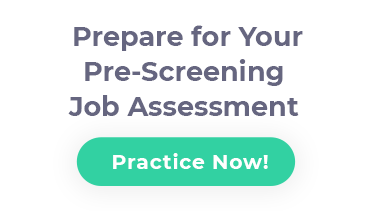Aldi Assessment Tests & Interview Process Preparation [2025]

What Is Aldi?
Aldi is a multinational retail store that was founded in Germany in 1946. In the past seventy years, Aldi has expanded to over eleven thousand locations in twenty countries. Their success has been attributed to their mission of providing high-quality products at the lowest market price.
Aldi was voted one of the top employers and one of the best internship opportunities. They employ tens of thousands of people across the world and offer benefits such as paid holidays and matching the retirement savings plan.
What Is Aldi’s Hiring Process?
Aldi’s hiring process consists of four stages over one to three months. Each stage is designed to assess the candidate’s aptitude and personality to see if they are a good fit for the company and if they align with Aldi’s values. Job seekers should expect to take the following steps during their interviews with Aldi:
- Application
- Online Assessments
- Video Interview
- Final Interview
Application
Aldi’s application takes about fifteen to thirty minutes to complete. Applicants are asked for basic information such as education and work history. Additionally, applicants are asked about volunteer work or important projects. In some cases, Aldi asks for a tailored CV and cover letter.
Aldi’s Online Assessments
If Aldi is interested in the candidate and finds their resume to be up to the company’s standards, they will be invited to take a few online assessments. These assessments evaluate the intelligence and behavior of the candidate. The results are only available to the administrator.
The online assessments are sent in a link via email. Typically, they must be completed within five days, but two or three days is preferred.
The content of the assessments depends on the location and role that is being applied for. For example, customer service positions do not require applicants to partake in a numerical reasoning test, but finance-related positions do. Candidates will have to take one or more of the following tests:
- Diagrammatic Reasoning Test
The diagrammatic reasoning test is non-verbal. This means that instead of letters or numbers, the assessment uses shapes. These shapes are arranged in a sequence or matrix with one of the shapes missing. The objective is to choose which shape, from a list of about five to seven, is the next logical shape in the pattern. Each question must be answered in less than a minute. The diagrammatic reasoning test appraises logical thinking and the ability to come to conclusions using ambiguous and novel information. The test is adaptive meaning that the questions get increasingly difficult as the candidate progresses through the assessment.
- Numerical Reasoning Test
The numerical reasoning exam is a mathematical aptitude test that evaluates the candidate’s proficiency with numbers and data. Specifically, the numerical reasoning assessment will be looking at the candidate’s ability to interpret graphs, analyze data, and perform mathematical operations. Three to five questions are paired to a graph or table that must be evaluated by the candidate. Each question is timed and multiple-choice. Similar to the diagrammatic reasoning test, the numerical reasoning assessment is adaptive.
- Situational Judgment Test (SJT)
The SJT assesses emotional intelligence. The test is designed to see how someone might react under stress or during a conflict in the workplace. The test largely focuses on the candidate’s communication skills but also takes manners and general temperament into account. The test taker will be provided with a passage laying out a hypothetical scenario followed by a response to the scenario. After reading both the scenario and the response, the test taker must rank how likely they are to have responded in that way. The answer should also be taken into the context of how appropriate said response was in a work setting.
- Verbal Reasoning Test
The verbal reasoning exam assesses the candidate’s reading comprehension, grammar, and vocabulary skills. The structure is similar to that of the numerical reasoning test with one passage being paired with three to five follow-up statements. The passages are short and discuss a variety of random subjects. Prior knowledge of the subject matter is unnecessary because the test looks to highlight the candidate’s ability to work with novel information. The follow-up statements must be marked as “True”, “False”, or “Cannot Say”. The questions are timed and adaptive.
Video Interview
If the candidate is successful with the online assessments, they will be invited to participate in a video interview. The video interview takes anywhere from ten to thirty minutes. The questions are competency-based and focus on how well the candidate fits in with Aldi’s environment. There are about ten questions that the candidate must answer. Some common questions asked by Aldi are:
- What is your five-year plan?
- Have you ever disagreed with a coworker? What did you do?
- Describe a time you took initiative.
- Why are you interested in Aldi?
The candidate will have thirty seconds to think of an answer to each question. After the thirty seconds is up, the camera will start recording for about ninety seconds.
While the interview is not live or in person, it is still important to dress and act professionally during the recording. Aldi will reach out in one or two weeks to invite the candidate to the final interview.
Aldi’s Final Interview
The final interview takes place at one of Aldi’s corporate offices. Candidates will meet with one of the hiring managers and a senior member of the department for the final interview. The questions are both job-specific and competency-based. Before the interview, candidates should research the company and current trends in their industry as these are likely to come up during the interview.
Aldi appreciates candidates who are confident and well-prepared. They also enjoy candidates who have questions. Some good questions to ask might be “what do you like best about working at Aldi” or “what is the most challenging part of this job”. Candidates should also review the company’s values before their interview; there a handful of questions about the candidate’s relation to these qualities.
How to Prepare for Aldi’s Online Assessments?
Aldi’s online assessments are considered the most difficult part of the company’s interview process. During this stage of the hiring process, about half of the candidates are cut from consideration due to their inability to meet Aldi’s benchmarks. This makes preparing for these assessments that much more important.
One of the most popular methods for preparing is online practice tests. They replicate the testing conditions to offer you a realistic idea of how your tests with Aldi will look like. You get the opportunity to practice with similar questions while managing the time constraints. Additionally, you can see your final scores which help you predict how well you will do on Aldi’s assessments.
Preparing for the situational judgment tests require a different course of action. This is because, technically, there are no right or wrong answers. The best way to prepare for the SJT is by reviewing Aldi’s values. This outlines what they expect from their employees. You can use these values as a reference during your SJT.
Conclusion
As one of the top workplaces and one of the largest grocery store chains in the world, Aldi presents itself as an amazing opportunity for job seekers. Make the most out of your interview by devoting a generous amount of time toward studying and putting your best foot forward. Best of luck!

